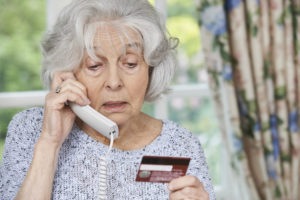For decades, scammers have fraudulently taken advantage of the Medicare population. However, with the introduction of computers and the internet, these criminals have found new, more deceptive ways to abuse the system. Thus, there has been an uptick in an all-out effort to crackdown on fraud and abuse. Resources and capabilities, with the help of health care providers, have been expanded to monitor and be more vigilant in the fight to stamp out fraud.
CMS (Centers for Medicare & Medicaid Services) has surged ahead with a campaign to review their billing processes for fraud. Nonetheless, you should still take a proactive approach in helping to protect yourself, your family and Medicare itself against fraudulent practices involving seniors.
Here are the 4 R’s of helping you protect yourself:
- RECORD: Keep a running list of all your appointments with your health care providers. This also includes laboratory tests, x-rays and any other diagnostic imaging or tests performed. Write down the exact admission and discharge dates, if you were in the hospital, as well as your diagnosis. Finally, remember to save any invoices and statements from all those providers.To help you with the recording tasks, if do not have a calendar, a local Senior Medicare Patrol program can assist you. They can provide you with a free Personal Health Care Journal. To find a local SMP, you can go online at smpresource.org. Alternatively, you can call them at 877-808-2468.
- REVIEW: Review your Explanation of Benefits (EOBs) or Medicare Summary Notices (MSNs) for any entries you think are incorrect or should not be there in the first place. Be aware of any charges for services, medical equipment or other items that you did not receive. If you had any hospital admissions, read your statements very closely. There may be medications listed which you had not taken. It is within your patient rights to question anything on your bills/EOBs/MSNs that do not appear justified.Whenever you pick up medication from a pharmacy, make sure you have the exact number of pills you were supposed to get. In addition, pay attention to the label on the bottle to verify that your name and medication, along with dosage is correct. Take charge of your health care and educate yourself on knowing what a provider can and cannot bill to Medicare.
- REPORT: How Do I report Medicare Fraud? If an error has been made on your bill or think that Medicare fraud has been committed, please see below for instructions on how to report it:
- Call Medicare at 1-800-MEDICARE. Be sure to have your Medicare number available.
- You may contact the Office of the Inspector General to report any fraud by calling 1-800-HHS-TIPS (1-800-447-8477). TTY users call 1-800-377-4950.
- You can also contact your local Senior Medicare Patrol office, which will help you in reporting fraud.
- REMEMBER: Be careful to protect your information against Medicare fraud by remembering these crucial tips.
- For y
 our security protection, do not divulge your Medicare number to anyone, other than your physician or other health care provider. In addition, be vigilant regarding your Social Security number. Do not give it out to anyone asking for it except people you know and trust.
our security protection, do not divulge your Medicare number to anyone, other than your physician or other health care provider. In addition, be vigilant regarding your Social Security number. Do not give it out to anyone asking for it except people you know and trust. - Be careful not to be taken in by any media advertisements that offer special deals asking you to give out your Medicare number. Some unscrupulous Medigap companies may try to obtain your number for the purpose of signing you up for insurance you do not want.
- Medicare will never contact you, nor ask you for your personal information, and that also pertains to your bank information.
- Keep an eye on your bank accounts to make sure any premiums, such as your Medigap premiums, are not higher than they are supposed to be.
In addition to the 4Rs above, be on your guard and pay close attention to the following:
- Never give your Medicare card to anyone else to use. Vice-versa, you should never use anyone else’s card.
- Never let someone else urge you to see a healthcare provider, unless you absolutely need to see one.
- Never buy any medical supplies or equipment from any door-to-door salesperson, if you did not talk to them prior to showing up. Medicare and Medicaid will never send a representative in person to your home.
The bottom line is that you have to take an active role in controlling your health and your information! Watch out for your medical records, which contain your personal health information. Be on the lookout for any Medicare scams, including fraudulent billing claims, drug prescriptions or medical equipment or services given by health care providers. Lastly, if you have a suspicion that any type of fraudulent activity has been committed, immediately contact your health care provider. Alternatively, you can get in touch with the fraud hotline, provided by the Dept. of Health and Human Services Office of the Inspector General, contact Medicare, or your SMP.
_____________________
65Medicare.org is a leading, independent Medicare insurance  agency for people turning 65 and going on Medicare. If you have any questions about this information, you can contact us online or call us at 877.506.3378.
agency for people turning 65 and going on Medicare. If you have any questions about this information, you can contact us online or call us at 877.506.3378.

 our security protection, do not divulge your Medicare number to anyone, other than your physician or other health care provider. In addition, be vigilant regarding your Social Security number. Do not give it out to anyone asking for it except people you know and trust.
our security protection, do not divulge your Medicare number to anyone, other than your physician or other health care provider. In addition, be vigilant regarding your Social Security number. Do not give it out to anyone asking for it except people you know and trust.